A beggar, looked at realistically, is simply a businessman, getting his living, like other businessmen, in the way that comes to hand. He has not, more than most modern people, sold his honour; he has merely made the mistake of choosing a trade at which it is impossible to grow rich.” — George Orwell, Down and Out in Paris and London
In all my years in Paris I’ve never been sure whether I should give money to panhandlers.
On the one hand, I feel bad for anyone in poverty. On the street, in the Métro, in the parks, I see people living in heartbreaking conditions.
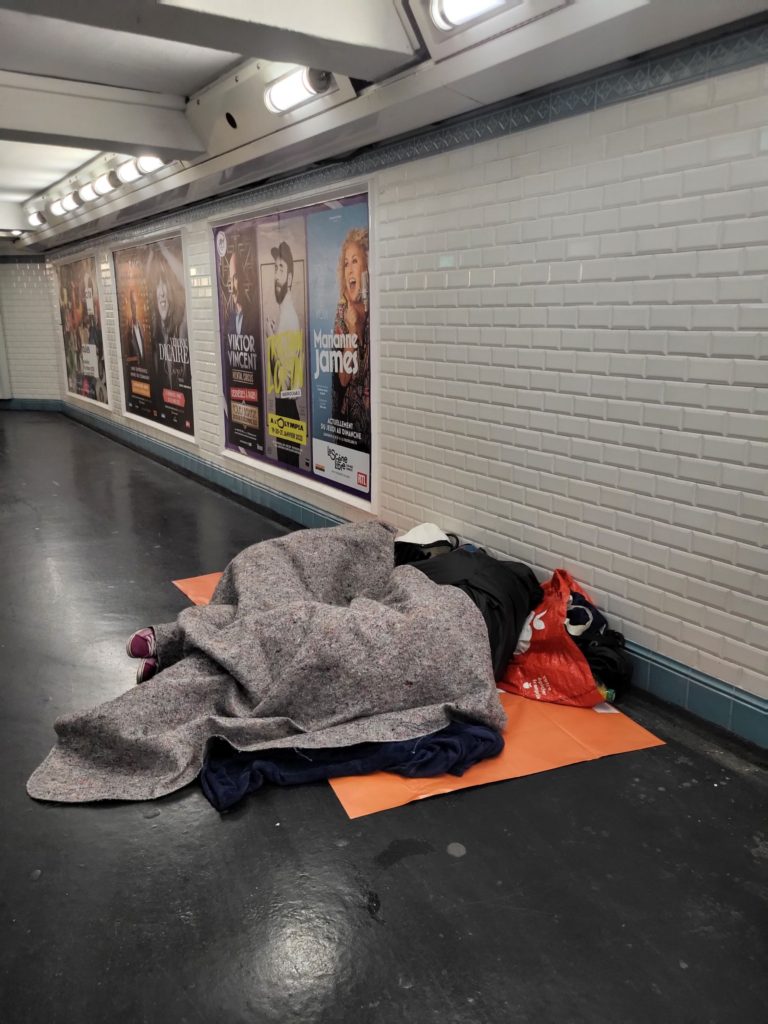
On the other hand, by giving money am I encouraging recipients not to work or – this is France, after all – not to take advantage of social services and assistance? This is my capitalist side speaking (I was a business reporter for decades) but I don’t mind asking the question.
To find an answer, I decided to revert to my old profession and play journalist. There were a couple of men in my neighborhood in the 17th arrondissement with whom I had been exchanging regular greetings, though no money changed hands. I would interview them, if they were willing.
I got some answers indeed during a freezing-cold week just before Christmas. And I got a surprise that changed the way I think about homelessness, and panhandling, and the vagaries of fortune.
The first person I talked to, a fixture for 15 years in the park in the middle of the traffic circle, was Alain. He cheerfully accosts people as they walk along the path to the Métro entrance or the other side of the circle, asking for “juste une petite pièce pour un café” – a little coin for a coffee. He never seems to mind when they ignore him.
I’d been greeting him regularly and seen him in the local Monoprix buying a bottle of water, and Charlie sees him on the bus at times. So I was feeling comfortable when I approached him.
But he had forgotten that we were on a “bonjour” basis and asked me what street I was looking for.
“I’m not, we know each other,” I said.
“Oh right. Well, if you’d needed directions I would have given them to you.”
As with the other people I talked to, I explained that I wanted to write about him and take his photo.
He told me he was French: born and raised in Paris. I asked him how he was doing in the sub-freezing cold.
“I’m hanging in there,” he said. “I’ve got five sweaters on.” He was also wearing two scarves and a mask, and said he went into a nearby café to warm up every so often.
He said he used to be in insurance 30 years ago. “Maybe I’ll do something else down the road,” he said. I wanted to ask more about his life before panhandling but remembered that he was French and thus probably guarded his privacy.
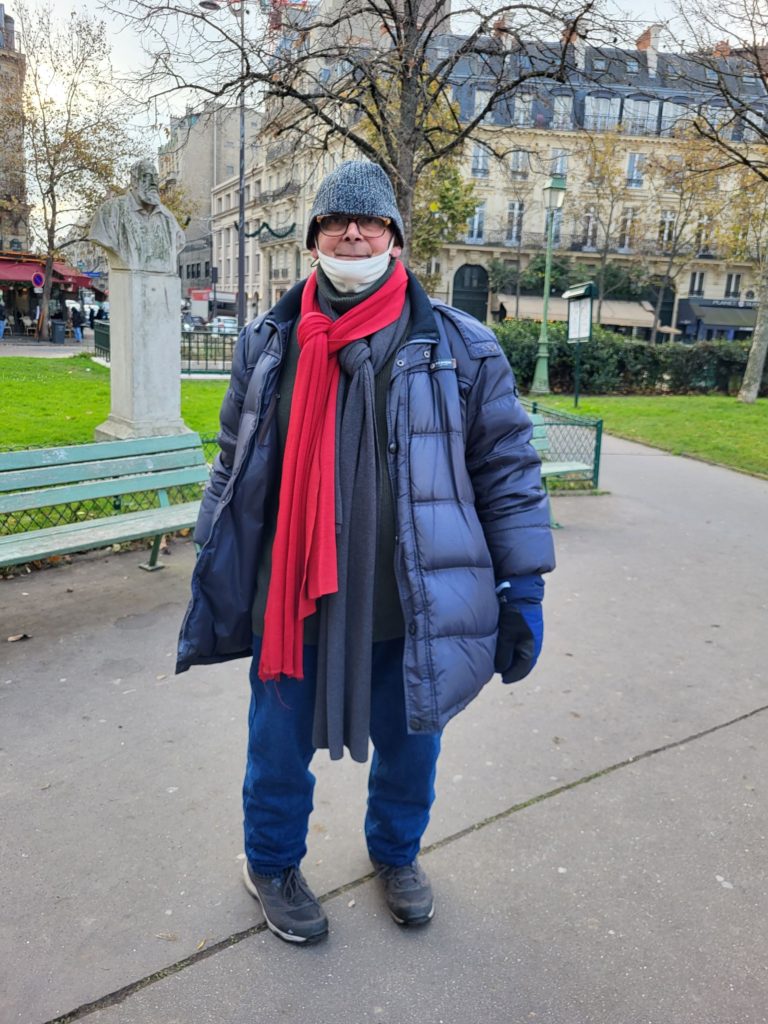
He did mention that he had visited Washington, after I told him I used to live there. “It’s a calm city,” he said. “Not like New York,” which he had also seen. “Too much happening there. Paris is a great city. Rome is a great city.” Has he been to Rome? “Once.”
As I left, he wished me Merry Christmas, in English.
This from a man who, by his own account, sleeps in the Vaugirard Métro station.
I’m not sure whether that’s by choice or necessity. Paris has resources for the those are who homeless, from emergency housing to long-term placement to medical care. A private association provides tents for those sleeping outdoors, partly as a prod to get the government to do more for the unhoused.
At best, it’s a stopgap solution.
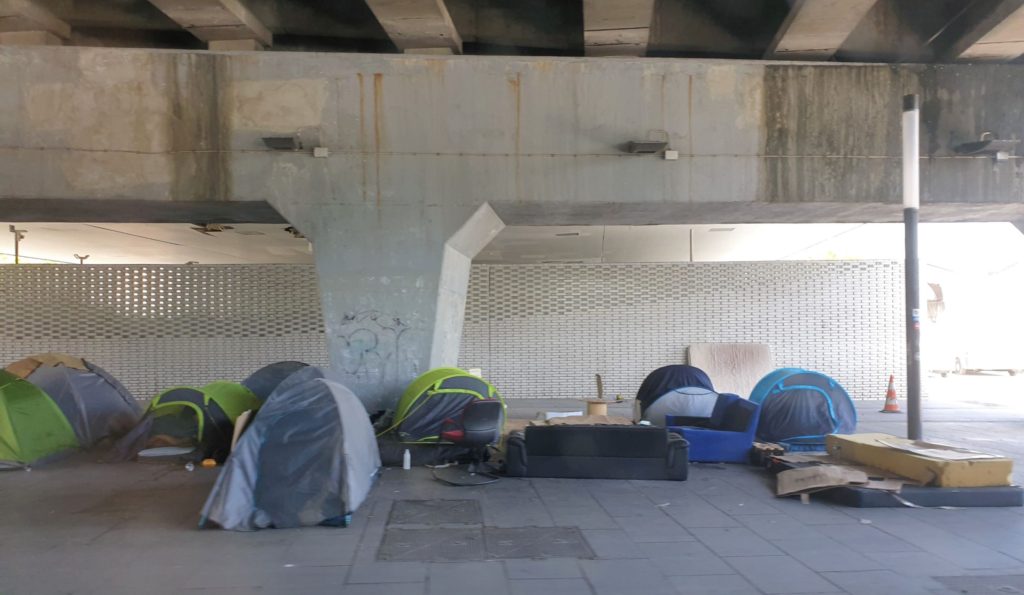
I’m sure housing associations would tell me much more needs to be done. But in some ways those without shelter are treated with more respect in France than in the U.S. Take the very name for homeless people: Sans Domicile Fixe (SDF) – without a fixed domicile. What Americans call homeless shelters are centres d’hebergement – shelter centers. There’s one near where I live. (I wrote a short story set there, in fact.)
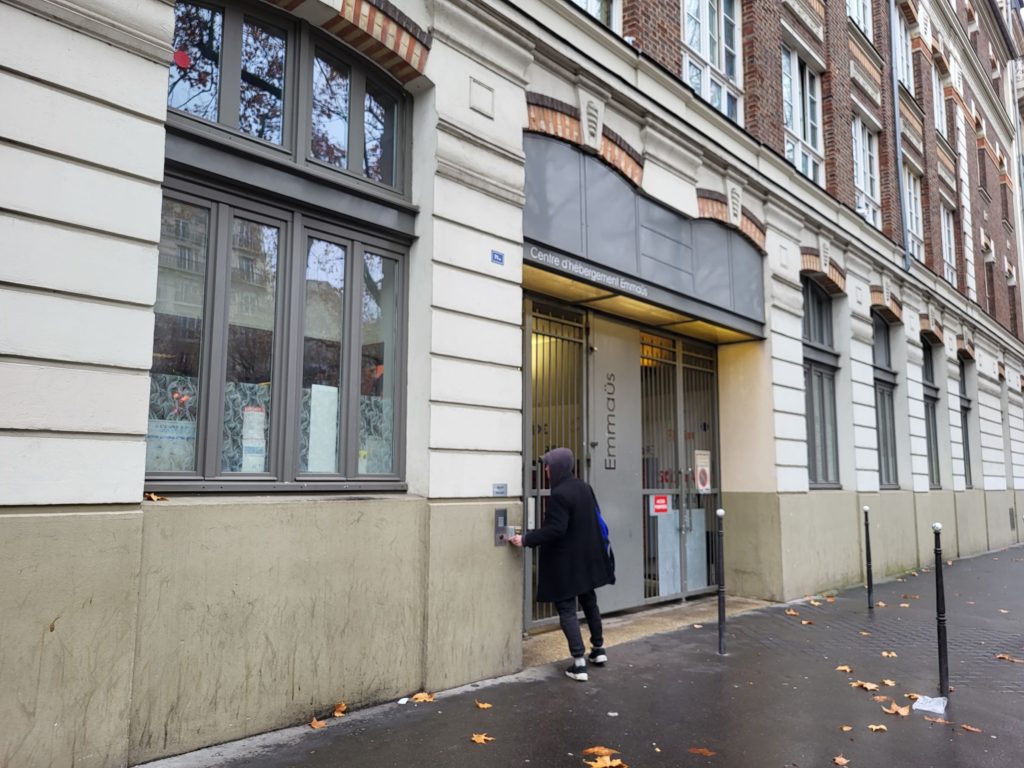
Neither of the two people I talked to lived in a shelter. Victor, my second interview subject, sleeps in an unheated little trailer in a park on the east side of Paris and heats up his food over a gas flame from a canister. “Aren’t you cold?” I asked as he sat on his stool outside a bank branch. “I use two covers and a blanket” was the response. He didn’t mention what it was like being outside in the freezing weather all day; I hoped the local cafés let him in as they do Alain.
A recent arrival to the neighborhood, Victor is from Romania and speaks very limited French. I wouldn’t have been able to learn much about him without Maria, who has cleaned our apartment for 10 years. She is also Romanian, and agreed to translate for me. In fact she’d already chatted a bit with Victor a bit on her way to work.
Victor was delighted to hear someone speaking his native tongue. As the afternoon rush-hour crowds walked by, he told Maria his story, which she then told me, deadpan. He has diabetes and prostate issues, and he fished in his dingy black backpack to show us his insulin pen. Does he get medical care here? I asked. Yes. He didn’t explain, but presumably he is treated under France’s health program for low-income people.
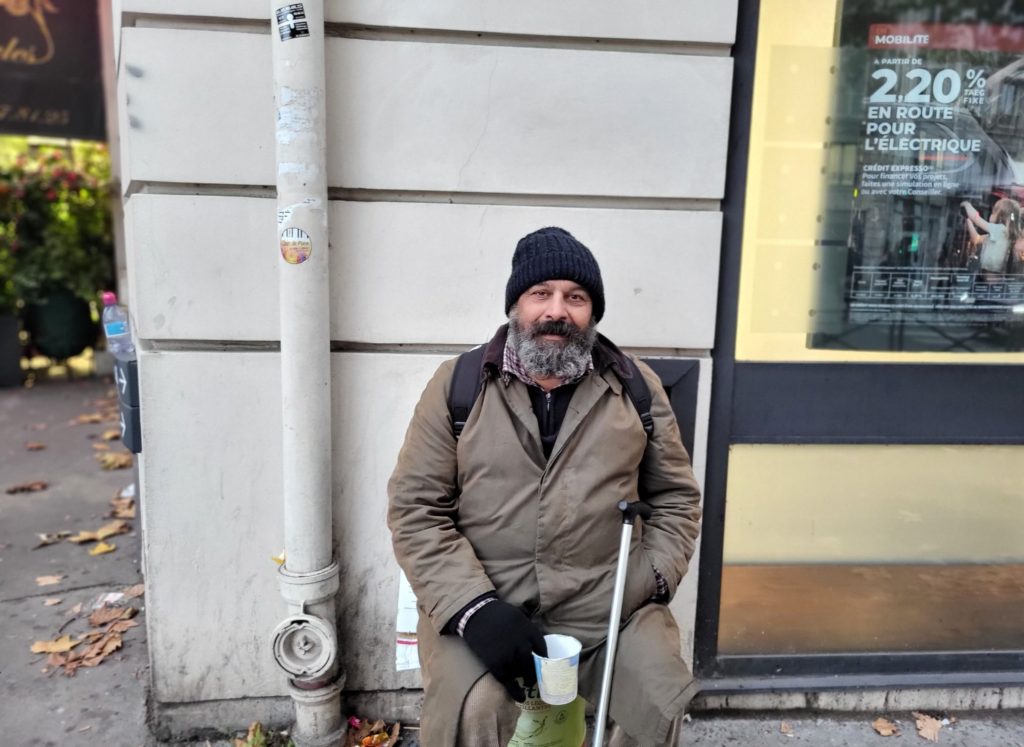
He came to Paris because he couldn’t get a job in Romania, one of the European Union’s poorest countries. Every Monday he sends his earnings to his wife and four children back home. There were maybe four euros in his cup before I dropped in a few more coins.
He doesn’t plan on staying long, he said, maybe through the winter. As we walked away, I said to Maria that I didn’t see how a family could survive on those earnings and how that poor man could live that way.
“But Madame Anne, I used to live like that too, when I first came to France,” she said.
I felt like I’d been hit by a stone. In the decade Maria had cleaned the apartment, we’d talked about her other employers, her husband’s health issues, their vacations in Vichy, the new upright vacuum I’d bought (She’s right, it’s terrible). I knew she and her husband lived in a Paris suburb not far from their children and grandchildren. Each summer we brought each other presents from our vacations; the one she gave us was almost always homemade Romanian liqueur.
But I’d never bothered to ask her the simplest question about her history.
As we stood by the Métro in sub-freezing temperatures, she told it to me: How she and her husband, Otto, had come to France 25 years before, at first sleeping outdoors under a bridge in Brittany in a tunnel through which water ran when it rained. She panhandled on the streets occasionally, and sold street newspapers. While she and Otto waited for their work papers to come through she did every odd job she could get, and so did he. Only a few years after Romania joined the European Union in 2007 did they gain the right to work in France and could send for their children.
“It was difficult,” was all she said about what that time was like.
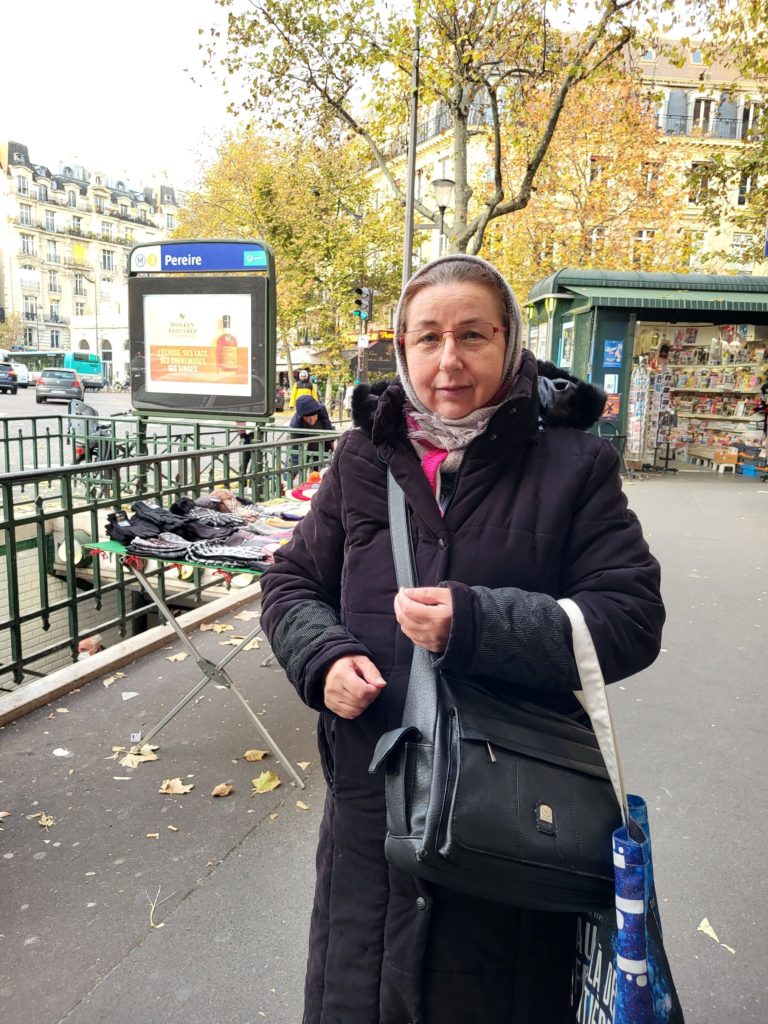
On reflection, I realized her story told me not just about her, but about Alain and Victor. They were all on a journey. What I saw was not what they had been, or might become. For Alain, it was away from a professional life, at least for the moment, to a peaceful park and five sweaters. For Victor, it was, perhaps, a stage that would let him bring his family to France and find a profession. For Maria and Otto, the stable life they had created would open up more opportunities for her children and grandchildren.
It made me wonder about the stories of the other people I saw on the street hoping for a few coins. Maybe I’ll ask them too.
Planted in Paris is taking a break and will return in the new year. Happy holidays, all! Drop a coin in every outstretched cup you see.
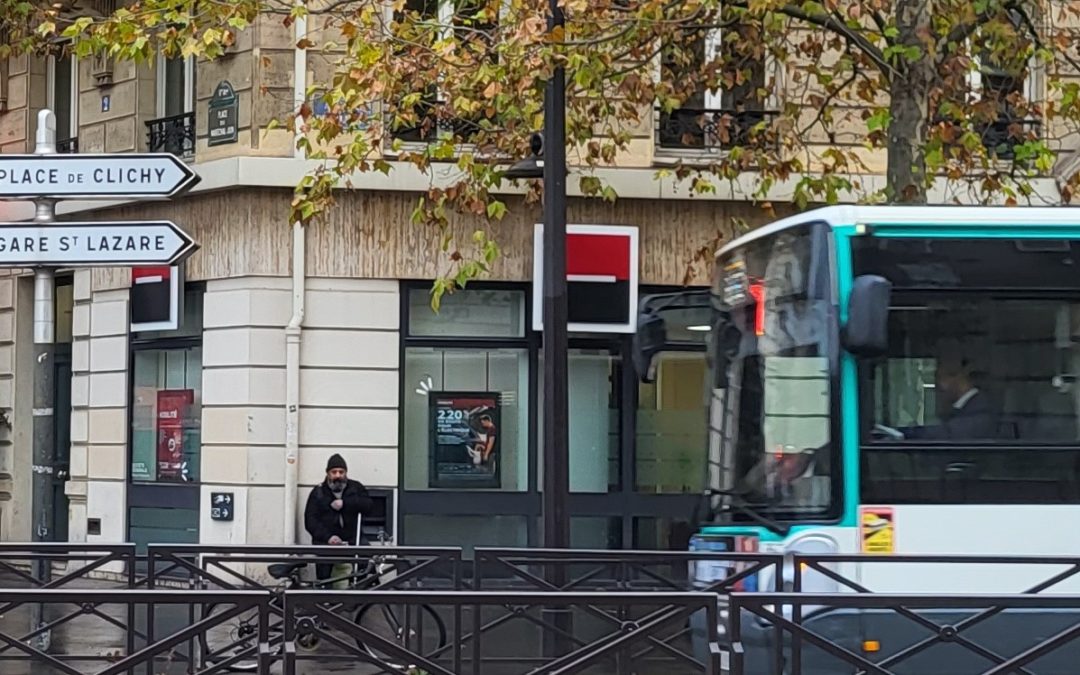
Excellent article, Anne, everyone has a story which calls out for compassion. Wishing you and yours a joyful Christmastide.
Thanks so much! I’m glad you enjoyed it, and best Christmas wishes to you too!
Wow great article . I once tried to interview homeless in NYC but they would not talk. I think the tape recorder I was holding was the problem. I offered money for there story and was soon surrounded by drug addicted people so I had to run for it. Very brave of you to write this .
Wow, I can see how that could have gone wrong! But I’m glad you liked the piece.
Thank you for this post Anne. So often assumptions are made about people who are homeless yet in North America I think the statistic is that everyone is 1 paycheque away from homelessness.
Perhaps it’s our fear that they may infect us with the virus of homelessness that makes us look away and think they are just lazy, and if only they’d work they wouldn’t have to disrupt our moods by seeing them on the streets.
Wishing you a wonderful holiday season and all the best for 2023. I look forward to more of your posts on all things Paris.
Thanks so much!
Anne, your article is so full of humanity. Beautifully written. Merci
Carol, that is so kind, thank you!
Lovely piece. Getting Maria to help pin down Victor’s story was brilliant. But what do you think about the notion that a lot of people from Rumania are trafficked by gangsters? When I see children sitting out in the cold I wonder what is going on.
Thank you David, I’m so glad you liked it. As far as I know those reports are true. I saw a documentary about it on French TV a while back, and Maria also said she’s heard of it.
Fascinating and wonderful (in both senses of the word) — I take my hat off to you (and throw some coins into it). A
Thanks so much, Adrian! Just don’t aske me to throw my hat in the ring.
What a wonderful article, and it starts with your curiosity and interest in those struggling to get by. Typical of your humanity, Anne.
Why thank you Ed, that is so kind. I’m very flattered and hope you’re well.
Nicely done, Anne. And Merry Christmas from across the street!
Thanks, Jim! We hope to see you there soon.
I’m so glad I read this. Thank you for writing it and the new insight that its given me.
Thank you so much, Diane!
When I worked in Paris, one of my colleagues lived about a 10 minute walk away. He mentioned an SDF who was regularly in a doorway of a building next to his Monoprix. Key word — “regularly.” On a sunny morning, hot or cold, that guy was there, ON TIME. Raining, he was there. Freezing cold? Even snow? The guy was NEVER late getting to his post. My colleague shook his head — “why doesn’t he have a job? I’d hire him! He’s never absent, he’s never late, he shows up, every day, without fail! Better than some of the people we work with!”
Brava! To you Maria Victor and Alain, at least!
Jeb Seder
Thank you!
Great piece. Proof once again that good old fashioned reporting is the best answer to almost any question, and helps open new windows on what we all thought we knew, or didn’t know we knew.
Thank you so much, Desson, I’m really happy that you enjoyed it.
Gets me thinking, as I always hope to do when I read something. Not a new idea but one worth repeating, over and over.
Thank you, Amy!
Very compassionate and humbling story, Anne.
I handled PR for the Los Angeles Mission in the mid-80s when homelessness was an emerging issue. We are still a long way from providing solutions.
More recently,
I remember reading that Pope Francis said not to hesitate to give to those who ask, who are living on the streets. Don’t question what they will spend the money on. If you’re worried they will spend it on wine, well, wouldn’t you want to drink some wine if you were in their place?
Compassion. Understanding. Generosity.
That’s really true, Joyce, and a good thing to remember. I’m so glad you liked the piece!